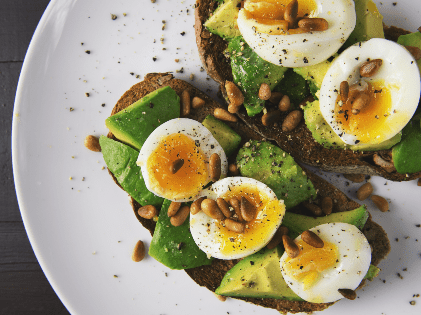 Eggs, as we know, are quite simple and inexpensive options among proteins. Diets rich in eggs are quite filling and nutritious. Though dieticians often have numerous proteins, vitamins, minerals, carbs, and fats to ensure a balanced diet. And that is why egg diets are becoming common these days. Therein eggs become the primary focus of protein intake.
Eggs, as we know, are quite simple and inexpensive options among proteins. Diets rich in eggs are quite filling and nutritious. Though dieticians often have numerous proteins, vitamins, minerals, carbs, and fats to ensure a balanced diet. And that is why egg diets are becoming common these days. Therein eggs become the primary focus of protein intake.
What Is An Egg Diet Meal Plan?
A typical egg diet plan does not necessarily have to be the same old-styled meal. You can always experiment and make varied versions of the diet. For example, plain boiled eggs are the easiest. Then there are poached or scrambled avatars and more. Depending on what you like or the number of calories and servings that you must consume, you can plan your egg diet likewise.
When cooking for others, consider an individual’s height, weight, activity level, gender, and dietary preference. It will help if you prepare food sans oil or butter, including cooking the eggs, while on this diet. Besides, avoid consuming potatoes, bread, and rice constitute starchy carbohydrates, as they are not ideal while on this diet. Not to miss out on foods high in sugar content and sweets too! For a better idea, you can check out these three variations of the diet plan that have become popular over the years.
Traditional Egg Diet

Going traditional means a person can consume proteins present in other sources. This retains considerable similarity with diets having high proteins and low carbohydrates. Among the major variations, this one is a hot favorite because of its simplicity and ease of preparation.
As much as eggs, the person can also eat low carbohydrate veggies like broccoli, spinach, and kale, lean proteins, and fruits (around 1 to 2 servings per day). However, it is better to skip the high-carb items like rice, pasta, and pieces of bread. A perfect example would be two eggs and a low-carb vegetable for breakfast, lean proteins with a green salad for lunch, lean protein or eggs, and low-carb veggies during dinner.
Eggs And Grapefruit Diet
For this meal plan to work wonders, you need to stick to the same low carb diet, with high proteins as per guidelines stated above. Additionally, you can consume half a grapefruit with every meal. A good example would be a grapefruit and two eggs for breakfast, one serving of lean protein coupled with half a grapefruit and spinach during lunch. You should also add lean proteins like fish or eggs (just one sterling) and half a grapefruit for dinner.
Extreme Egg Diet
 As the name suggests, it’s a strict egg-based diet. This allows for eggs and water at every meal, which is undoubtedly a restrictive and difficult diet for many people to follow for a specified time duration. Merely consuming one type of food, however, is not a recommended solution to lose weight. After all, it can lead to nutritional deficiencies can arise. So it’s always preferable to stick to a diet that would be balanced, with emphasis on eggs.
As the name suggests, it’s a strict egg-based diet. This allows for eggs and water at every meal, which is undoubtedly a restrictive and difficult diet for many people to follow for a specified time duration. Merely consuming one type of food, however, is not a recommended solution to lose weight. After all, it can lead to nutritional deficiencies can arise. So it’s always preferable to stick to a diet that would be balanced, with emphasis on eggs.
So Is It Really Effective?
That’s the million-dollar question! No research has till now proved that a specific egg diet would ensure safety and efficacy. However, substantial research into this type of type and the frequency of consumption that would lead to adequate weight loss has shown that eggs can impact the one consuming them. Firstly, you tend to have a lesser intake of calories, which undoubtedly boosts the weight loss function.
Given that it’s a protein-rich diet, there’s evidence that such diets help deal with weight issues. Scientists who have earlier conducted studies on this cited proof how high protein intake assist in tackling obesity, type 2 diabetes, metabolic syndrome prevention, cardiovascular ailments like atherosclerosis, and more. Also, proteins impart a ‘full’ feeling, which naturally prevents people from overeating. And hence, it is a great way to lose weight.
Though eggs are best known for the protein content, they also provide the right doses of vitamins like vitamin A, vitamin B-12, vitamin D, and minerals like iron, calcium, phosphorus, magnesium, selenium, potassium, folate, choline, and antioxidants. Though eggs are otherwise safe, consult your specialist before falling back upon this idea. This would help you avoid unnecessary health issues and complications in the future.
